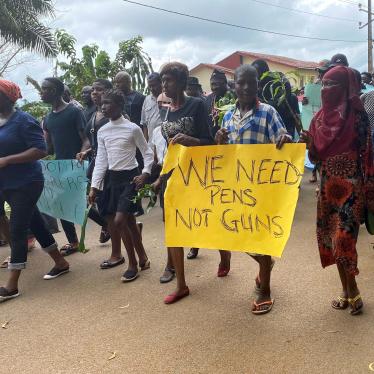Aminata D. is a self-confident, energetic 11-year-old girl who lives in southern Mali. When I meet her at the Worognan gold mine, she tells me that she never goes to school. Instead, she works in gold mining, using toxic mercury on a daily basis. She describes her work to me: "Once the ore is panned, you put a bit of mercury in. You rub the ore and the mercury with your two hands. Then, when the mercury has attracted the gold, you put it on a metal box and burn it."
At least 13 million small-scale miners worldwide dig for gold in informal, small-scale mines, and virtually all of them use mercury. Mercury is a highly poisonous metal that attacks the central nervous system and is particularly harmful for children. Unfortunately, most miners do not know this, nor are hospitals equipped to address the problem. Aminata says: "I know mercury is dangerous but do not know how. I do not protect myself."
Situations like Aminata's seem intractable. Is there anything that can be done here in Switzerland, about this far-away problem? The answer is yes. And it is not as far away as one might think. Starting on Sunday, Switzerland is hosting talks in Geneva to finalise an international treaty on mercury. Governments from around the world will come together to decide on measures to reduce mercury use and exposure worldwide. The Swiss government is one of the key supporters of the treaty process, both financially and politically.
A lot is at stake. For the mercury treaty to become a strong and effective tool, it must mandate legally binding measures for reducing mercury, preventing harm to people's health and providing healthcare. Unfortunately, many governments - particularly Canada, the United States and the European Union - are reluctant to include specific health prevention and treatment strategies in the treaty. They contend that this treaty is about the environment, that health measures would make the treaty too expensive or that they are already sufficiently covered.
Switzerland should stand up and make clear it supports a stand-alone article on health measures, to protect people's right to health. The mercury exposure of hundreds of thousands of children should be addressed explicitly, urgently and actively. The health sector should not be left out of the treaty. Prevention measures should include public and targeted awareness - raising on the dangers of mercury, training on mercury-related conditions for health workers and data gathering among affected populations; measures that are lacking in many countries. Governments also need to develop plans to test and treat people with symptoms of mercury poisoning.
At the last round of talks, Switzerland supported a provision requiring governments to put in place health measures for mining communities and for children such as Aminata and her fellow workers. This is a step in the right direction. Switzerland is a destination for much of the world's gold. It should also be the source of a solution to one of gold's deadliest problems.
But a narrow provision on mining is not enough. Mercury is present in many areas - such as industrial production, coal burning and dental medicine - and affects many people around the globe. For the mercury treaty to become a truly global force, it needs to define comprehensive health strategies alongside environmental measures. Addressing the health impact of mercury cannot be accomplished through environmental measures alone.
Juliane Kippenberg is a researcher at the Human Rights Watch campaign group







